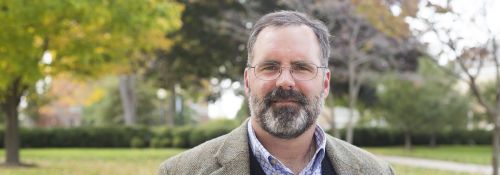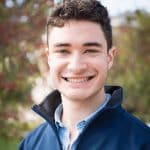
Duty, Courage, and the Soul
Spotlight on Dr. Peter Jennings
Written by Finn Cleary
Sitting in his office, you get an immediate feel for the institution that has most impacted Dr. Peter Jennings’ life: the Marine Corps. An old recruitment poster hangs next to the door, and the screensaver on his desktop rotates between pictures of his family and his time in Iraq and Kuwait.
A new professor in the business department, Dr. Jennings is a tall, broad-shouldered man, and his boots, brimmed hat, and beard add to the rugged look provided by the multitude of books and memorabilia tucked into the corners of the office. Before he came to Hillsdale, he had earned a MBA, a Ph.D. from Arizona State, and worked at IBM in the hard disk drive division. Before that, he was commissioned into the Marines.
“I joined out of college,” Dr. Jennings says. “I didn’t have any noble or honorable ambitions, other than I was terrified of a real job. I was a kid looking for adventure.”
His first tour of duty was in Kuwait, where the Marines drove Saddam Hussein back into Iraq. He saw combat and stayed on active duty for five years after the Gulf War. He was on an executive track in operations and management at IBM when he received a call from the Marines that would take him back to active duty.
It was 2004, three years after 9/11, and the military and political situation in Iraq was destabilizing again. Insurgency in the nation had reached urban areas, and the Marines needed officers.
“It was very different. When I had first enlisted, I was a young college kid, but now I had a wife and a family. I understood what war was all about. It wasn’t convenient to go, but I went. I didn’t go for adventure, or for convenience, but because I felt a sense of duty.”
Dr. Jennings fought in the Second Battle of Fallujah, one of the bloodiest and heaviest urban combat engagements of the war. He continued to serve in the area around Anbar and was involved in more combat in Iraq.
His experiences had shown him courage in friends who had sacrificed their lives. He experienced the “bone-shaking fear” of bullets and shrapnel in a fight. He knows what it’s like to grip yourself, realize that you have a duty to perform and a job to carry out, and to understand that duty may involve your demise.
“The idea of courage is something I had encountered in combat, but I had no idea about Aristotle’s understanding of the virtue. It was something I sought more and more.”
During his time in the Marines, Dr. Jennings had received a list of books to read. The list, which varies by rank, includes The Art of War by Sun Tzu, biographies of generals, and other classics.
“Those books,” he says, “opened the aperture of my mind for the ideas that have deepened and broadened my sense of the world. As I read on, I realized I was profoundly ignorant about certain ideas central to a liberal arts tradition.”His readings in courage and virtue included the Laches, an early Platonic dialogue between Socrates and Laches, son of Melanopus. In the work, the general not only speaks about courage as the ability to stand and fight but also as a “a certain perseverance of the soul.”
“I can read Plato’s dialogue on courage,” Dr. Jennings says, “and understand what General Laches is saying about how it relates to the soul. Although it’s an imperfect definition, there is a truth to it. I can identify with that Greek warrior from two thousand years ago and understand what he means by courage. Things like that drew me into the liberal arts.”
Dr. Jennings is currently teaching two courses in leadership with a focus on readings in classic literature and philosophy.
 Finnegan Cleary, class of ’18, is a history major with plans to work in the public policy field. During his one year (and counting) with the blog, he has focused on stories about Western thought and the importance of community. When he isn’t writing or reading, he enjoys cooking and long-distance running. Finnegan is from Columbus, Ohio.
Finnegan Cleary, class of ’18, is a history major with plans to work in the public policy field. During his one year (and counting) with the blog, he has focused on stories about Western thought and the importance of community. When he isn’t writing or reading, he enjoys cooking and long-distance running. Finnegan is from Columbus, Ohio.